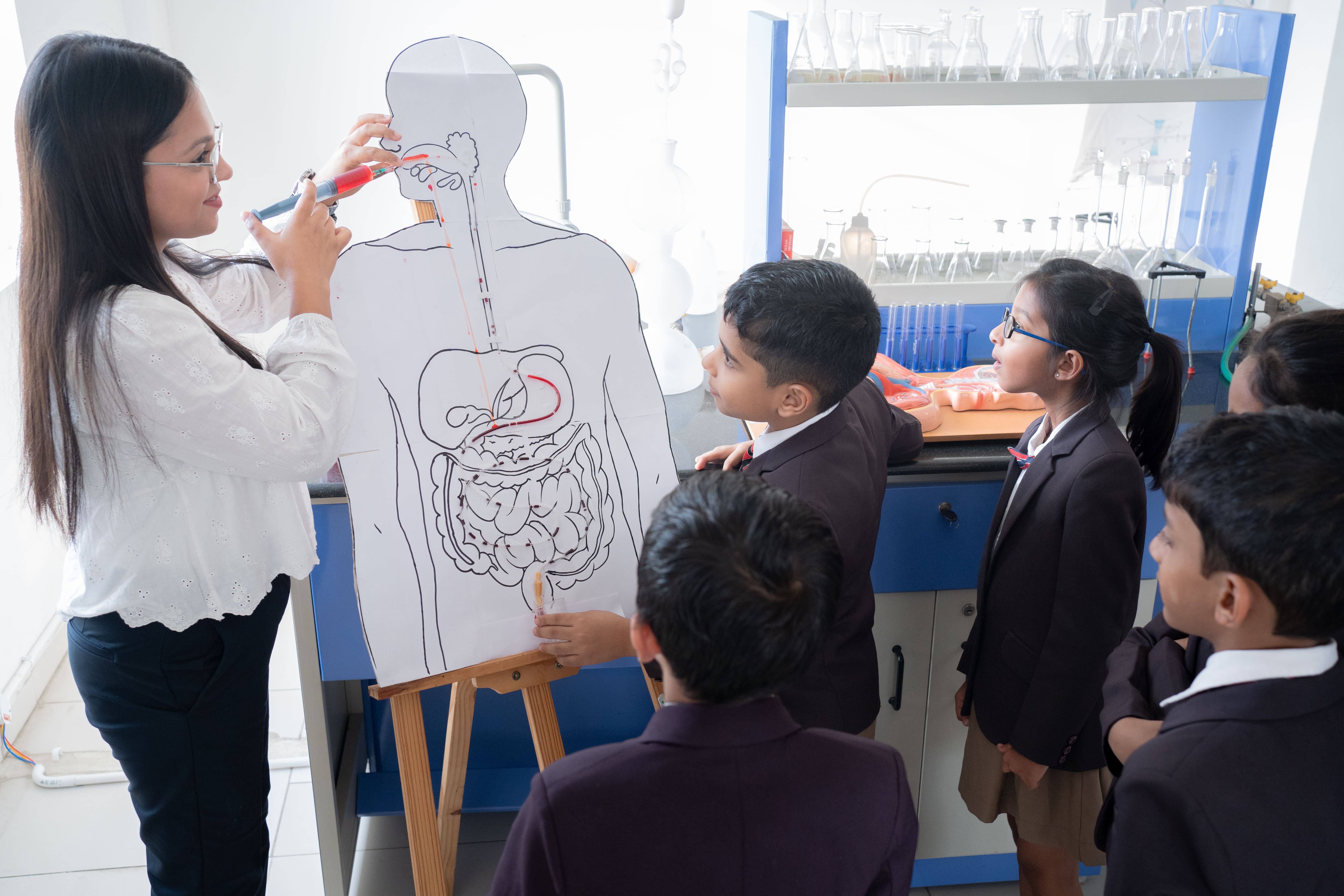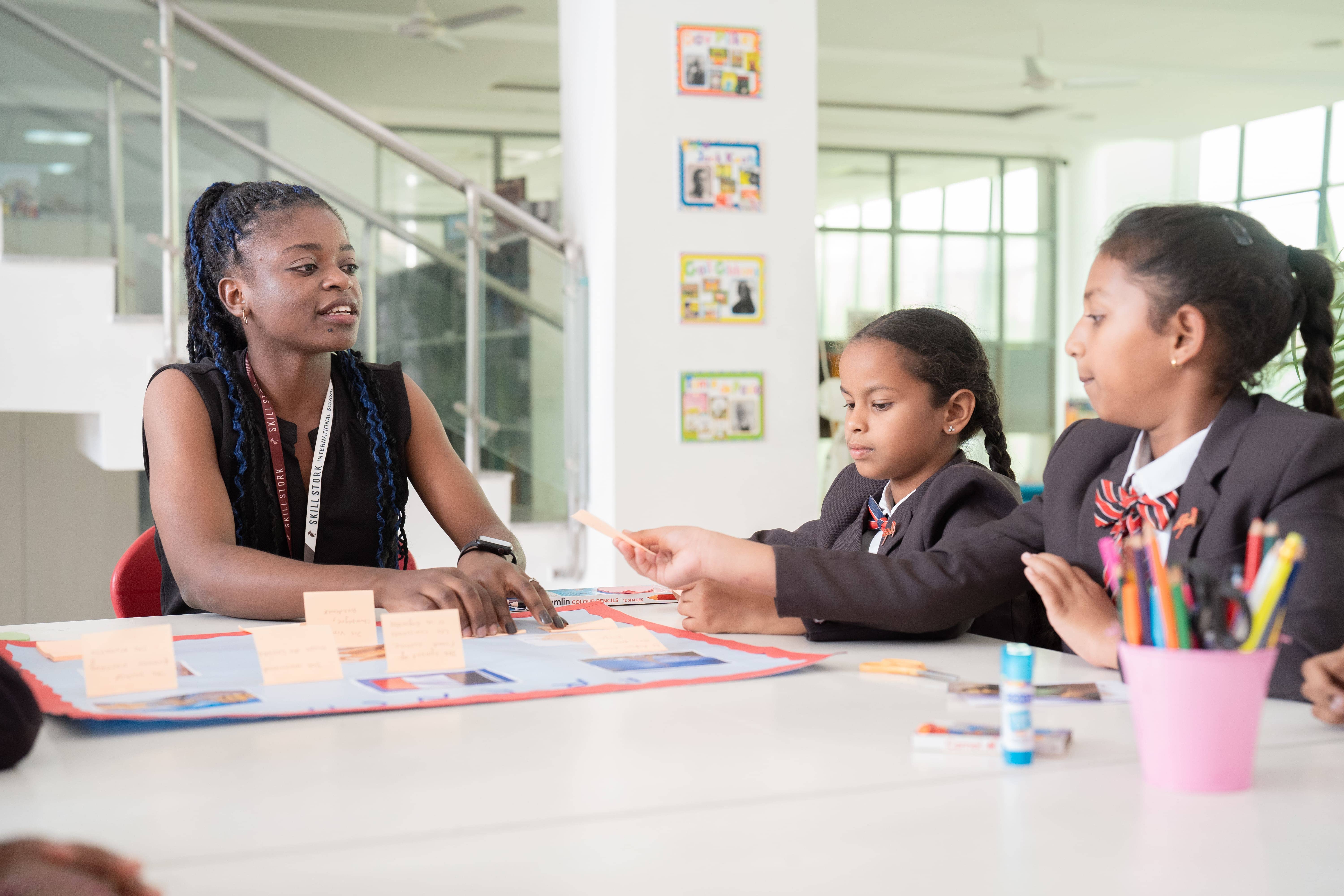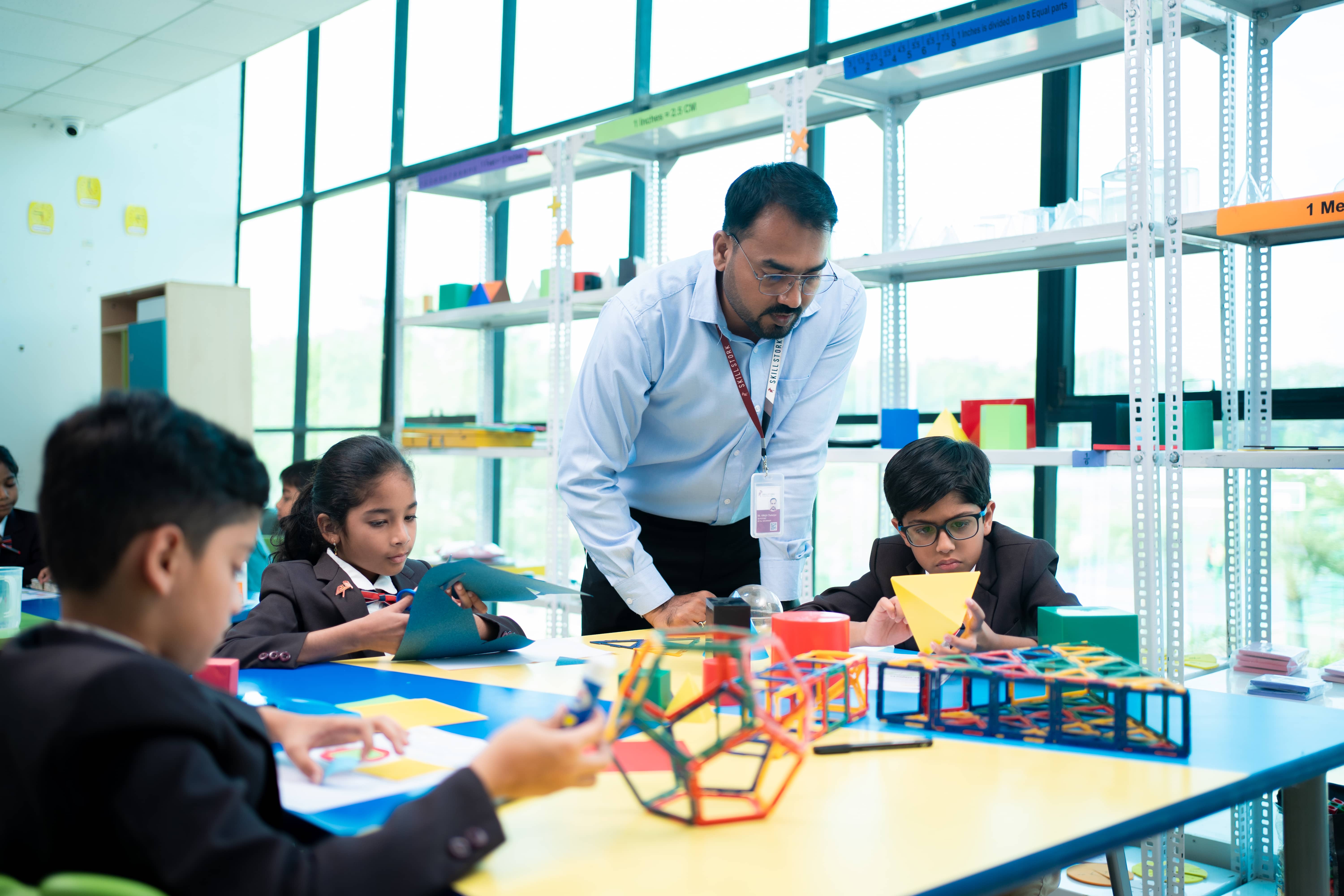- Discover the IB PYP at Skill Stork International School
- What Makes the IB PYP Unique?
- Learning That Grows with Your Child
- Core Features of the IB PYP: A Holistic Framework
- Our Approach: Where Inquiry Meets Progression
- The Tools of Learning: Skill Development at Every Stage
- Progression in the PYP at Skill Stork International School
- Enriching Learning Through Innovation
- Building Connections: A Holistic Approach
- The Culmination of the PYP Journey: Exhibiting Excellence
- Heart of IB: Attributes of IB Learner Profiles
- IB Elements in PYP: Building Skills Through Inquiry
- A Home for Global Citizens
Discover the IB PYP at Skill Stork International School: A Journey of Progression and Growth
At Skill Stork International School , the International Baccalaureate Primary Years Programme (IB PYP) is more than just a curriculum—it’s a journey of discovery, growth, and transformation. Tailored for learners aged 6 to 12 years, the PYP nurtures curiosity, inspires inquiry, and develops lifelong skills that grow alongside the child, preparing them to navigate the complexities of the world with confidence and compassion.

What Makes the IB PYP Unique?
The PYP is built on the belief that students learn best when they explore concepts that are meaningful to their lives. Its holistic approach focuses on the whole child, addressing academic, social, and emotional development through an inquiry-based learning model. At its heart lies a commitment to fostering international-mindedness, global citizenship, and lifelong learning.
The PYP is a framework, not a prescriptive curriculum, allowing flexibility for schools to design learning experiences aligned with local contexts and global expectations.

Learning That Grows with Your Child
The PYP journey is designed to grow with students, from early explorations of the world to complex inquiries about global challenges. Each phase builds on the previous one, ensuring a seamless progression of knowledge, skills, and understanding.

Lower Primary (Ages 6-8): Making Connections
- Focus: Developing inquiry skills and connecting ideas across subjects.
- Key Attributes Developed: Critical thinking, collaboration, and empathy.
- Examples:
- Transdisciplinary Theme: Who We Are
- Inquiry: “How do body systems work together to keep us alive?”
- Activity: Students engage in hands-on activities to explore the circulatory, respiratory, and digestive systems, deepening their understanding of how these major body systems function and connect.
Upper Primary (Ages 9-12): Engaging with Global Challenges
- Focus: Independent inquiry, critical analysis, and taking informed action.
- Key Attributes Developed: Responsibility, leadership, and global awareness.
-
Examples:
- Transdisciplinary Theme: Sharing the Planet
- Inquiry: “How does war impact societies and relationships?”
- Activity: Students investigate historical or contemporary wars, focusing on their causes, effects, and resolution efforts.


Core Features of the IB PYP: A Holistic Framework

Transdisciplinary Themes: Connecting Learning Across Subjects
The six transdisciplinary themes provide a foundation for inquiries into big ideas that matter globally and locally:
- Who We Are
- Where We Are in Place and Time
- How We Express Ourselves
- How the World Works
- How We Organize Ourselves
- Sharing the Planet
Through transdisciplinary learning, our students learn to appreciate knowledge, conceptual understandings, skills and personal attributes as a connected whole. They reflect on the significance of their learning to take meaningful action in their community and beyond. Through this process of learning in the PYP, students have become competent learners who have the cognitive, affective and social tools to engage in lifelong learning in a self-directed manner.
Each theme is revisited at deeper levels as students’ progress, with examples ranging from understanding families in Grade 1 to exploring migration in Grade 5.


Specified and Related Concepts in the IB PYP
- Specified Concepts are universal, enduring ideas like Form, Function, and Change that guide students in making meaningful, transferable connections across subjects.
- Additional Concepts are subject-specific ideas like Energy, Adaptation, or Symmetry, enriching students' understanding within particular disciplines and adding depth to their inquiries.
Together, they enable holistic and interconnected learning experiences.
- Grade 2 focuses on Connection: “How do words and pictures work together in a story?”
- Grade 5 expands to Interdependence: “How do technological advancements shape human interactions?”
Our Approach: Where Inquiry Meets Progression

Inquiry-Based Learning:
We empower students to take charge of their learning through the Inquiry Cycle. By exploring Transdisciplinary Themes (TD Themes) and focusing on concepts, students investigate real-world problems, ask meaningful questions, and develop deep understanding. The PYP Inquiry Cycle—tuning in, finding out, sorting out, taking action, and reflecting aims to drive exploration and discovery. Students engage with meaningful, real-world problems, fostering curiosity and agency.
Example:
- In Grade 2, students explore measurement through hands-on activities, such as measuring the height of plants, the amount of water used for watering, and the size of leaves using rulers and measuring cups.
- In Grade 4, they analyse the impact of natural disasters by creating models, such as a volcano, to understand how these events affect communities and the environment.


IB Learner Profiles in Action:
The IB attributes—such as being communicators, inquirers, and thinkers—are seamlessly embedded into every aspect of our curriculum, fostering international- mindedness and making students future-ready
The Tools of Learning: Skill Development at Every Stage

The PYP focuses on developing five key Approaches to Learning (ATLs):
- Thinking Skills: Analyzing, evaluating, and generating ideas.
- Research Skills: Collecting, organizing, and presenting information.
- Communication Skills: Expressing ideas through multiple mediums.
- Social Skills: Working collaboratively and resolving conflicts.
- Self-Management Skills: Setting goals and managing time effectively.
Example:
- Grade 1: Students develop research skills by sorting information into categories.
- Grade 5: They synthesize data from multiple sources and present findings using multimedia tools.

Progression in the PYP at Skill Stork International School
Progression in the PYP is a carefully planned journey where each stage builds on the last, ensuring growth in academic and personal dimensions.

Skills Progression
Students acquire and demonstrate skills in research, communication, social interaction, self-management, and thinking, equipping them for future challenges.


Conceptual Understanding
The emphasis on key concepts—form, function, causation, change, connection, perspective, responsibility, and reflection—ensures students develop transferable understanding applicable across contexts.
Assessments for Growth
We use diverse assessment tools, including
- Baseline, diagnostic, and ongoing assessments to map progress.
- Checklists, rubrics, anecdotal records, and presentations to measure growth.
- Feedback designed to move from reflection to actionable goals, aligning with our Feedback to Feedforward philosophy.
- Action-Oriented Learning: The culmination of learning lies in action—students apply their knowledge and skills to make meaningful contributions to their community.

Enriching Learning Through Innovation
At Skill Stork International School, we integrate the IB framework with our unique strategies to provide a robust learning experience:


- Differentiated Learning and ILPs: Tailored learning paths ensure every child’s potential is maximized.
- Goal Setting: Students actively set and review their academic and personal targets.
- Visible Thinking Routines (VTRs): Encourage critical and reflective thinking.
- Multilingual Opportunities: Students learn to communicate effectively in multiple languages.
- Integration of Arts and Sports: Visual arts, performing arts, and sports are integral, fostering creativity and teamwork.
Building Connections: A Holistic Approach

Beyond the Classroom
- Fostering Collaboration: At our school, we believe in creating opportunities for students to connect, collaborate, and grow alongside peers from other institutions. Through inter-school exchange programs, collaborative projects and virtual classrooms, our learners engage in meaningful dialogue, share ideas, and gain diverse perspectives.
- Field Trips, Guest Sessions, and Labs: Extend learning to real-world applications.
- Learning Spaces: Well-equipped labs and classrooms promote curiosity and experimentation.
Strong Parent Partnerships
- Regular newsletters and updates on “What’s New?” ensure transparent communication.
- One-on-one meetings allow for collaborative discussions on student growth.
- Events like Academic Fests and PTMs provide opportunities to celebrate achievements and gather feedback.
Celebrations of Diversity
Through cultural events and global observances, students learn to respect and cherish diverse values, fostering international-mindedness and a sense of global citizenship.

The Culmination of the PYP Journey: Exhibiting Excellence

The PYP Exhibition is the pinnacle of the PYP experience. Students demonstrate their learning through transdisciplinary inquiries, showcasing:
- In-depth research and exploration of real-world issues.
- Application of concepts, skills, and attributes developed over the years.
- Meaningful action and agency, reflecting their growth as global citizens.
Heart of IB: Attributes of IB Learner Profiles
At Skill Stork International School, the PYP fosters the holistic development of IB Learner Profiles by embedding reading, speaking, and writing into meaningful and authentic learning experiences. In Grades 1 and 2, the focus is on building foundational literacy skills through guided exploration, storytelling, and structured conversations. As students progress to Grades 3 to 5, the emphasis shifts to developing critical thinking, creative writing, and articulate expression, empowering learners to engage with complex concepts and share their insights confidently.

Here is a detailed table to show the progression of the IB Learner Profiles across Grades 1 to 5, focusing on reading, speaking, and writing:
| IB Learner Profile | Grades 1 & 2: Foundational Stage | Grades 3 to 5: Advanced Stage |
|---|---|---|
| Inquirers | Students read simple texts, ask basic "why" and "how" questions, and explore ideas through guided discussions. | Engage with complex texts, conduct research, and pose thought-provoking questions to deepen understanding. |
| Thinkers | Practice making predictions, identifying story elements, and solving simple problems in texts. | Analyze characters, evaluate arguments, and craft structured essays that demonstrate logical reasoning. |
| Communicators | Develop oral language skills through storytelling and sharing ideas in group discussions. Write short sentences and labels. | Participate in debates, present research findings, and write persuasive essays with clear structure and arguments. |
| Principled | Listen to stories with moral themes, discuss right and wrong, and write short reflections. | Reflect on ethical dilemmas in literature, write narratives with moral lessons, and communicate principles clearly in group discussions. |
| Open-Minded | Read stories from different cultures and discuss similarities and differences. Share thoughts through simple writing. | Explore global literature, write reflective pieces on cultural understanding, and engage in open discussions respecting diverse perspectives. |
| Caring | Listen to stories about empathy, write thank-you notes or caring messages, and role-play kind acts. | Write descriptive narratives about acts of kindness and participate in group discussions showing empathy and support. |
| Risk-Takers | Try reading new and unfamiliar texts, and practice sharing ideas even when uncertain. Write creative responses to prompts. | Take on challenging reading materials, write innovative creative pieces like poems or plays, and confidently present in front of larger groups. |
| Balanced | Balance listening to stories and engaging in independent reading. Practice writing and speaking in both academic and creative contexts. | Explore a variety of text genres, balance informative and creative writing, and discuss themes that encourage mental and emotional growth. |
| Reflective | Reflect on what they learned from stories or class discussions, and write or draw simple reflections. | Write detailed journals, reflect on personal growth and academic goals, and share reflections during presentations. |
| Knowledgeable | Read age-appropriate non-fiction books, learn new vocabulary, and write short factual sentences. | Conduct research on various topics, write detailed expository texts, and deliver presentations that showcase depth and knowledge. |
IB Elements in PYP: Building Skills Through Inquiry
In the PYP, Specified Concepts and Approaches to Learning (ATL) are integrated into inquiry-driven learning to develop critical thinkers and reflective learners. Younger students focus on foundational skills like reading and communication, while older grades expand into critical thinking, creative writing, and collaborative research. These elements ensure holistic growth, fostering curiosity, deep thinking, and meaningful connections across subjects.

| Skills | Sub-Skills | Subjects | Examples | Key Concepts | Leading Questions |
|---|---|---|---|---|---|
| Thinking Skills Example: Concept Senses |
Critical Thinking | Language Arts, Math | Learners analyse character decisions in a story and evaluate their outcomes. Learners solve multi-step problems and justify their solutions. | Function, Perspective | 1. Why did the character make this decision? 2. What strategy helps solve multi-step problems? 3. How can you justify your answer? |
| Analysing and Evaluating | Science, Social Studies | Learners evaluate the reliability of scientific sources. Learners analyse causes and effects of historical events. | Causation, Evidence | 1. How can you tell if a source is reliable? 2. What were the main causes of this event? 3. What were the effects of this decision? | |
| Forming Decisions | Math, Social Studies | Learners decide how to allocate resources in a class project. Learners form conclusions about fairness in laws from different time periods. | Responsibility, Perspective | 1. How did you decide how to allocate the resources? 2. Why is this law fair or unfair? 3. What factors influenced your decision? | |
| Creative Thinking | Arts, Design, Science | Learners design a model to explain a scientific concept. Learners create a unique piece of art inspired by natural patterns. | Change, Creativity | 1. How does your model explain the concept? 2. What natural patterns inspired your artwork? 3. How can your design be improved? | |
| Generating Novel Ideas | Science, Language Arts | Learners brainstorm new ways to conserve water. Learners write an original poem that conveys a unique perspective. | Innovation, Exploration | 1. How can your idea help conserve water? 2. What makes your poem unique? 3. How does your idea solve the problem creatively? | |
| Considering New Perspectives | Social Studies, Literature | Learners compare cultural viewpoints on holidays. Learners debate ethical dilemmas from multiple perspectives in literature. | Perspective, Empathy | 1. How are these cultural viewpoints similar or different? 2. What makes this ethical dilemma challenging? 3. How does perspective shape understanding? | |
| Information Transfer | All Subjects | Learners apply math skills to analyse science experiment results. Learners use historical timelines to write about chronological events. | Connection, Application | 1. How can math skills help in this experiment? 2. What does the timeline show about historical events? 3. How do these subjects connect? | |
| Reflection and Metacognition | All Subjects | Learners reflect on feedback received during a writing task. Learners track and review their progress in learning multiplication. | Reflection, Responsibility | 1. How has the feedback helped you improve? 2. What does tracking your progress tell you? 3. What changes will you make moving forward? | |
| Research Skills Example Concept - Exploration | Information Literacy | History, Science | Learners create a research plan on climate change. Learners synthesize and present findings about a historical leader. | Inquiry, Evidence | What steps will you take to research climate change? What makes this historical leader important? 3. How will you present your findings effectively? |
| Formulating and Planning | Social Studies, Science | Learners develop steps to investigate an environmental challenge. Learners outline a plan for comparing ecosystems. | Organization, Inquiry | 1. What is the first step in your investigation? 2. How will you compare the two ecosystems? 3. What tools do you need to plan effectively? | |
| Data Gathering and Recording | Math, Science | Learners collect temperature data and organize it in graphs. Learners observe and record the life cycle of a butterfly. | Evidence, Patterns | What does your temperature graph show? How does recording observations help understand the life cycle? Why is accurate data collection important? | |
| Synthesizing and Interpreting | Language Arts, Science | Learners write a summary based on multiple sources. Learners analyze experiment outcomes and draw conclusions. | Connection, Understanding | 1. What are the main ideas from the sources? 2. What does the experiment tell you? 3. How do you connect your findings? | |
| Evaluating and Communicating | ICT, Social Studies | Learners critique and improve their presentations on community challenges. Learners assess the reliability of their research sources. | Responsibility, Integrity | How can your presentation be improved? What makes a research source reliable? 3. Why is clear communication important? | |
| Media Literacy | ICT, Language Arts | Learners compare advertisements to evaluate bias. Learners create digital content that adheres to ethical standards. | Perspective, Ethics | What biases do you notice in these advertisements? 2. How does your digital content reflect ethics? 3. Why is understanding bias important? | |
| Ethical Use of Media/Information | ICT, Social Studies | Learners use citations in a project and discuss why it is important. Learners evaluate the impact of copyright in creative industries. | Integrity, Responsibility | Why are citations important in a project? 2. How does copyright affect creativity? 3. What are the consequences of unethical media use? |
EY3 A Home for Global Citizens
Our vision is to create a nurturing environment where students flourish as confident, empathetic, and knowledgeable individuals who are ready to take on global challenges. At Skill Stork International School, every step in the learning process is intentional, progressive, and meaningful, preparing students to become lifelong learners and responsible global citizens.

